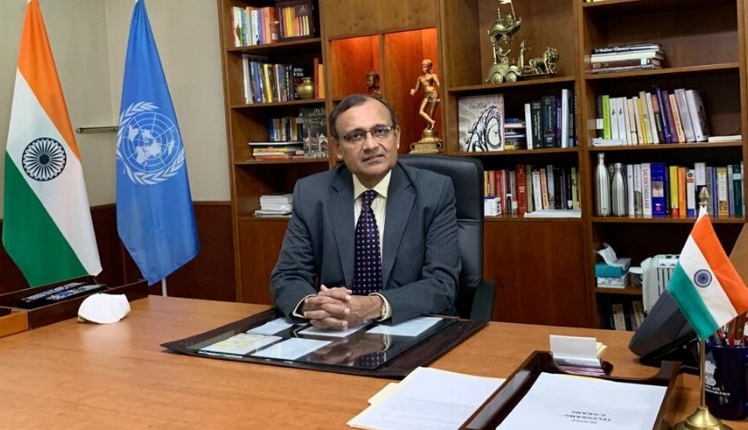United Nations: Under the shadow of the rushed US troop withdrawal from Afghanistan, India Friday warned that terrorism from across the Pakistan border must end for peace in the country.
India’s Permanent Representative T.S. Tirumurti, said at an informal meeting of the Security Council, “Afghanistan can succeed only when terrorism no longer flows across the Durand Line, the border with Pakistan.”
“It is important to ensure that no one provides sanctuary to terrorists who threaten Afghanistan or any other country in the region. Those who do so must be held accountable,” he said.
The recent targeted attacks on Afghan security forces, universities, women in positions of responsibility and youth “only serve to highlight the concerted effort by terrorists and their sponsors to erode the gains of the last two decades,” he said.
He said, “The international community, simply cannot, afford to lose the gains of the last two decades. The progress achieved so far is hard-won. The future which we seek should have a place for every Afghan and should have space for everyone’s aspiration.”
Afghanistan’s President Ashraf Ghani, who spoke earlier, said that terrorism continues despite Taliban’s assurances to break away from Al-Qaeda and other terror groups.
“I would request the Council to stress the effective and thorough implementation of sanctions regimes as a key instrument for the success of the negotiations with Taliban,” he said.
India, which will become an elected member of the Security Council, was invited in a transitional process to participate in the informal session, known as an Arria Formula meeting.
Tirumirti said, “We will be starting our tenure in the Security Council at a crucial juncture for Afghanistan. We extend our assurance that India will continue to provide all support to the Government and people of Afghanistan.”
The meetings of this type are held away from the Security Council, are not put on record, and usually held in private to allow frank discussions, especially on sensitive matters on which members may not be able to speak in public.
But Friday’s meeting was held online and broadcast by the UN.
Amid concern that the direct peace talks between the US and the Taliban were sidelining the elected Afghan government, Tirumurti said without a direct reference to it, “The peace process must be Afghan-led, Afghan-owned and Afghan-controlled. Solutions must come from the Afghans themselves, in line with the wishes and aspirations of all sections of Afghan society. Sovereignty and territorial integrity of Afghanistan must be respected.”
Like many of the speakers, Tirumurti called for protecting the rights of women and minorities that are in danger from the Taliban having a role in the government.
“Respect for human rights and democracy needs to be ingrained in any framework that a future Afghanistan designs for itself,” he said.
Noting the extensive assistance that India has given Afghanistan at the cost of Indian lives, he referred to Pakistan’s restrictions on India sending help to Afghanistan directly by land.
Without naming Islamabad, he said, “It is important to ensure that the issue of full transit rights to Afghanistan is not used by states to extract political price from Afghanistan. The international community should discourage medieval mentalities and work towards removal of artificial transit barriers imposed on Afghanistan.”
Representatives of Council members avoided direct mention of the US troop withdrawal by January 15 announced this week by Acting Defence Secretary Christopher Miller, who said that only a barebones force of 2,500 would remain in Afghanistan to protect US installations.
Laurel Miller, the Asia Director of the International Crisis Group, who gave a briefing said that the incoming presidential administration of Joe Biden could look back at some aspects of the agreement with the Taliban in view of the developments.
IANS
